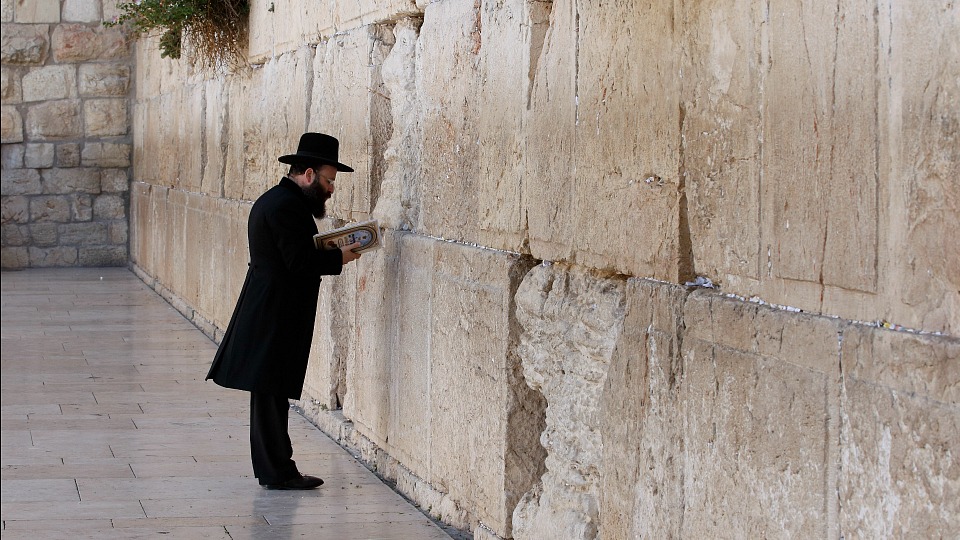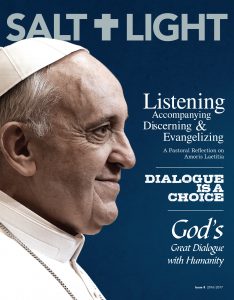

Rebuilding the Culture of Faith
Salt + Light Media
Tuesday, February 21, 2017

CNS photo/Paul Haring
“He imposes peace in His heights. Can His troops be numbered? On whom does His light not shine?[...] even the moon is not bright, and the stars are not pure in His sight.”
Book of Job, Chapter 25
Few books of the Bible are as telling as The Book of Job. Some books of the Bible are filled with stories of a bygone era, and yet others are filled with the details of laws and regulations. But it is Job that looks solely into the complexity of living because Job’s book has no laws. It may be The Book of Job is the most religious book of the Torah - because Job sees the questions of life but does not hide from searching for answers. The Job we discover doesn’t throw his hands to the air because he may not understand life or God. No - even in the face of unimaginable losses Job goes looking for answers. Like Hemingway’s Robert Jordan in For Whom The Bell Tolls Job looks everywhere, but unlike Jordan he refuses to let despair be his answer. With Job in mind I placed at the top a quote I would like to share with you. On a side note, this verse is also used at the conclusion of the Kaddish – that iconic and most ancient of Jewish prayers. But leave it to the greatest of Biblical commentators RaSHI (Rabbi Shlomo Yitzchaki ca 11th century) to lead us to its important lesson. When Job writes,“He imposes peace in His heights,”Rabbi Shlomo Yitzchaki (RaSHI) says;
“…fire of the sun and the water of the clouds – neither extinguishes the other…they all live in peace together.”In other words in “His heights” - in the heavens - it is peace that rules supreme. Job gazes at nature’s blueprint and there he sees that light (the sun and stars) burns alongside water (the clouds) and neither is diminished or destroyed by being with the other. Job’s lesson is true of nature, and it must be true of our nature as well. For too long Christians and Jews have been burdened by a history of suspicion and pain. Nostra Aetate has cleared the path for Jews to have confidence the past need not be repeated, and for Catholics to see us as partners in building a culture of faith in the world. In saying the “gifts of God are irrevocable” it echoes the words of Job in saying our ability to sit, talk, and listen to one another only strengthens us and the truths we hold dear. Each of our traditions claim different things yet they all come from the wellspring of those “heights” that inspired Job, RaSHI and countless faithful of all faiths. As Jews emerge from our High Holy Day period of Rosh HaShanah and Yom Kippur and Catholics observe their sacred period of Lent let us reflect on this “peace from most high” that needs to live between us all. --
 Rabbi Aaron Flanzraich was born in Brooklyn, NY in 1966 is the Senior Rabbi of Beth Sholom Synagogue in Toronto, Ontario. He is a graduate of Bar Ilan University where he was admitted into the University's prestigious Advanced Talmudic Institute. Rabbi Flanzraich is a past president of the Toronto Board of Rabbis, past president of the Christian Jewish Dialogue of Toronto, co-chair of the Catholic-Jewish Bioethics Board, a board member of the Canadian Rabbinic Caucus, UJA-Jewish Federation of Greater Toronto, a member of Israel Bond's Rabbinic Cabinet, board member of the Jewish National Fund and the author of a book on combating Jewish fundamentalism called "The Small Still Voice". Rabbi Flanzraich is also a frequent guest on TVO, Vision TV, and CBC.
Rabbi Aaron Flanzraich was born in Brooklyn, NY in 1966 is the Senior Rabbi of Beth Sholom Synagogue in Toronto, Ontario. He is a graduate of Bar Ilan University where he was admitted into the University's prestigious Advanced Talmudic Institute. Rabbi Flanzraich is a past president of the Toronto Board of Rabbis, past president of the Christian Jewish Dialogue of Toronto, co-chair of the Catholic-Jewish Bioethics Board, a board member of the Canadian Rabbinic Caucus, UJA-Jewish Federation of Greater Toronto, a member of Israel Bond's Rabbinic Cabinet, board member of the Jewish National Fund and the author of a book on combating Jewish fundamentalism called "The Small Still Voice". Rabbi Flanzraich is also a frequent guest on TVO, Vision TV, and CBC.
“We have just commemorated the 50th anniversary of the Second Vatican Council’s Declaration “Nostra Aetate.” On 28 October last, I was able to greet a large number of Jewish representatives to whom I said “Deserving of special gratitude to God is the veritable transformation of Christian-Jewish relations in these 50 years. Indifference and opposition have changed into cooperation and benevolence....The Council, with the Declaration Nostra Aetate, has indicated the way: “yes” to rediscovering Christianity’s Jewish roots; “no” to every form of anti-Semitism and blame for every wrong, discrimination and persecution deriving from it.” Nostra Aetate explicitly defined theologically for the first time the Catholic Church's relations with Judaism. It did not solve all the theological issues that affect us, but it provided an important stimulus for further necessary reflections. On 10 December 2015, the Commission for Religious Relations with the Jews published a new document that addresses theological issues that have emerged in recent decades since the promulgation of “Nostra Aetate”....It is clear there is an inseparable bond between Christians and Jews. Christians, to be able to understand themselves, cannot not refer to their Jewish roots, and the Church, while professing salvation through faith in Christ, recognizes the irrevocability of the Covenant and God’s constant and faithful love for Israel.” - Pope Francis’ Address at the Synagogue of Rome, January 17, 2016
 *This article was originally published in the 2016-2017 Salt + Light Magazine! Order your copy today.
*This article was originally published in the 2016-2017 Salt + Light Magazine! Order your copy today.Related Articles:
>>













